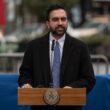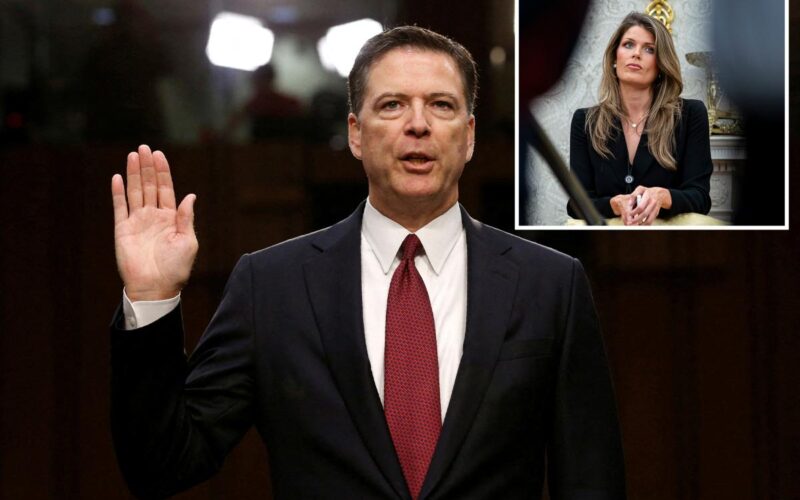Embattled former FBI Director James Comey demanded his case be dismissed Friday, arguing that “fundamental errors” were made in the “reckless and ill-conceived” attempt to prosecute him for allegedly lying to Congress and obstructing justice.
Comey, in a 29–page filing in an Alexandria, Va., federal court, cited alleged grand jury rule and Fifth Amendment violations by interim US Attorney Lindsey Halligan in his bid to dismiss the Sept. 25 indictment against him.
“Those errors reflect the reckless and ill-conceived nature of this prosecution: A president intent on prosecuting Mr. Comey before the statute of limitations expired directed the appointment of a White House aide, Lindsey Halligan, as interim U.S. Attorney, and she then rushed to secure an indictment while flagrantly violating basic grand jury rules in the process,” Comey’s legal team wrote.
“Those grand jury errors warrant dismissal twice over,” they added.
The document focuses on alleged “fundamental errors in the grand jury process,” which came up during a hearing earlier this week and defense lawyers fleshed out in the filing.
The grand jury “never approved the operative indictment,” defense lawyers claim.
“At least 12 jurors did not concur in the operative two-count indictment; and the grand jury rejected the only indictment that the government presented to it,” the filing states. “The government’s attempt to prosecute Mr. Comey without a valid ‘indictment of a Grand Jury’ violates the Fifth Amendment.”
The argument stems from confusion that arose when Halligan suggested earlier this week that only “the foreperson and another grand juror” were present when the indictment was handed up.
Comey’s team argues the remark signals that the requisite number of jurors did not see the final version of the indictment, after jurors rejected one of the counts against the former FBI director in the three-count indictment.

However, prosecutors in the US Attorney’s Office for the Eastern District of Virginia, led by Halligan, are adamant that federal grand jury procedures were correctly followed.
In their own filing Thursday, Halligan’s team provided the court with a transcript from the grand jury proceedings which they argue contradicts the defense team’s claim.
“[A]ny assertion that the grand jury ‘never voted on the two-count indictment’ is contradicted by the official transcript,” Halligan’s team wrote.
The transcript “confirms the Court’s recognition that the two-count true bill is the valid, operative indictment,” their filing continued.
In the transcript, the grand jury foreperson affirmed – when asked by the judge overseeing the grand jury – that jurors voted on the indictment with the two counts.
“The complete record eliminates any doubt: The foreperson confirmed the vote. The Court acknowledged the vote. The Court docketed the two-count true bill as the operative indictment. Only Count One lacked concurrence; Counts Two and Three were true-billed by at least twelve jurors,” the prosecutors said.
In the defense filing, Comey’s lawyers countered that “there is no record of the grand jury seeing the new indictment — let alone voting on it.”
They describe the prosecution’s efforts to clear up what took place in the grand jury courtroom as “late-breaking” and resting on an “erroneous overreading of an ambiguous exchange between the grand jury foreperson and the magistrate judge.”
Comey’s filing goes on to argue that “dismissal is independently warranted because of the government’s misconduct before the grand jury.”
“Among other things, the government relied on information it obtained in violation of the Fourth Amendment and the attorney-client privilege; and it made serious misstatements of law to the grand jury,” the defense team argues.
Comey is scheduled to head to trial on Jan. 5, 2026, and faces up to five years in prison if convicted on both counts.








